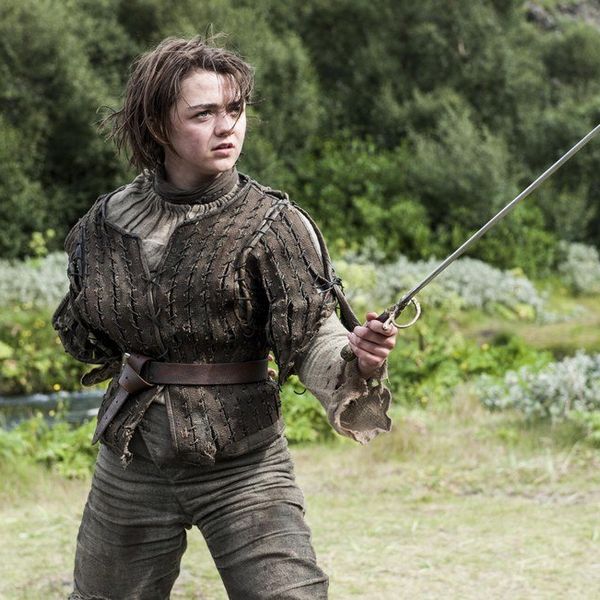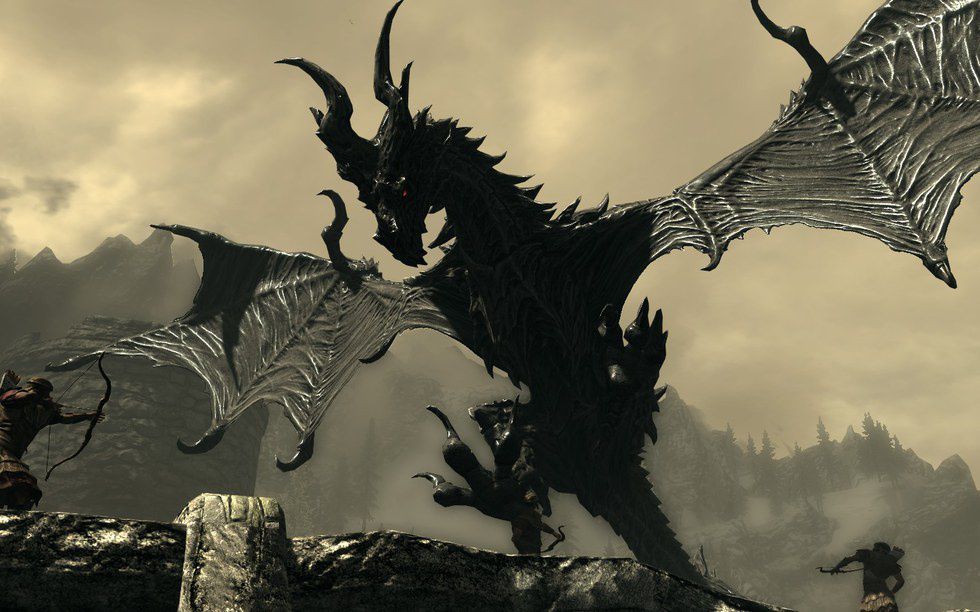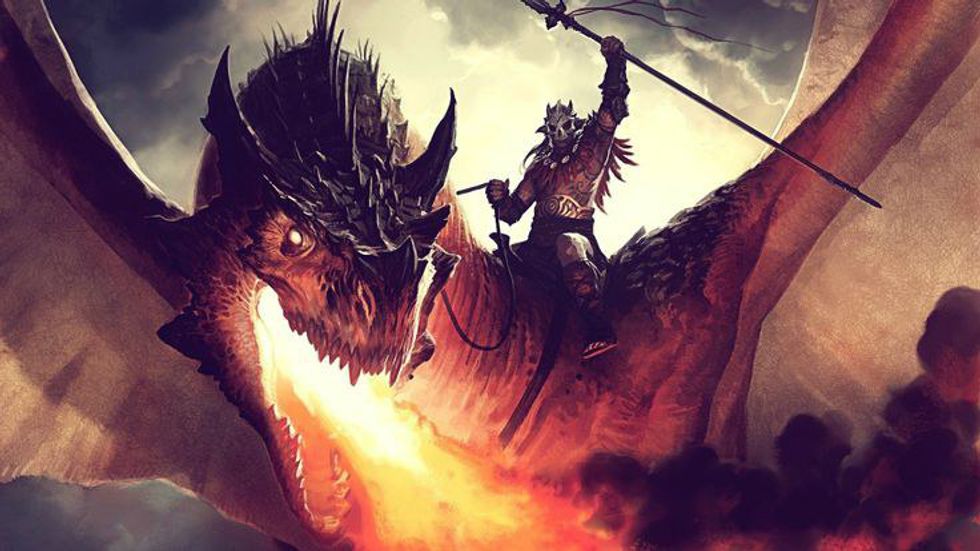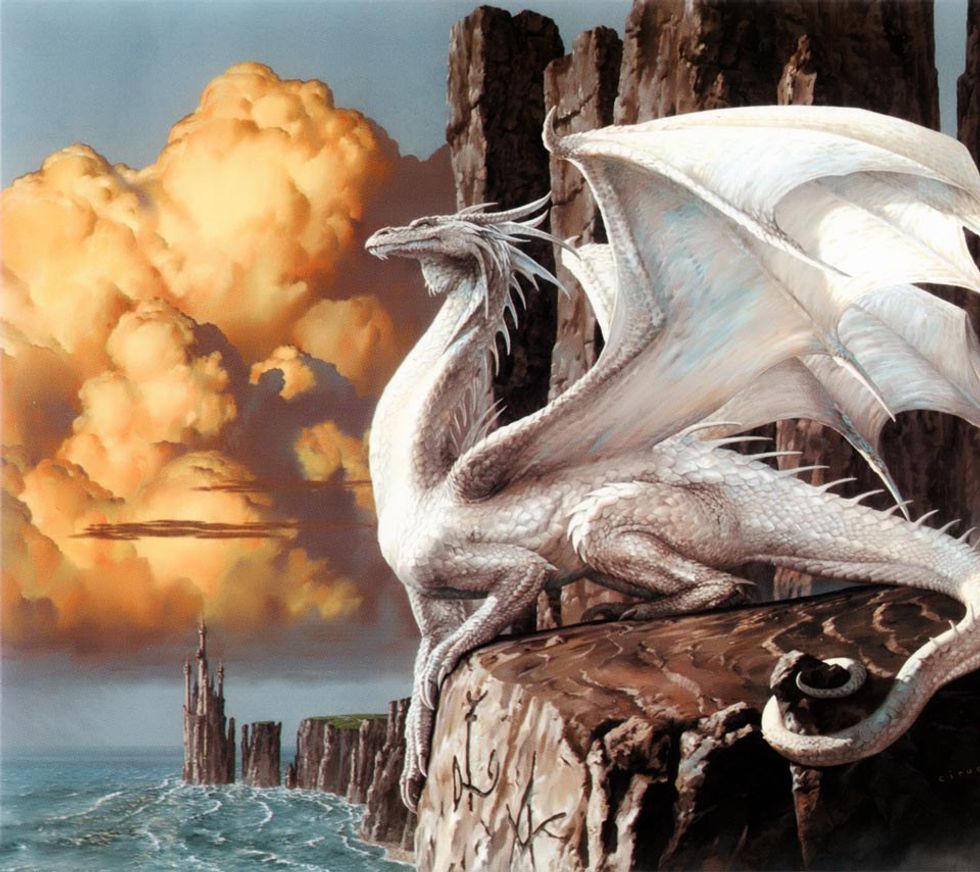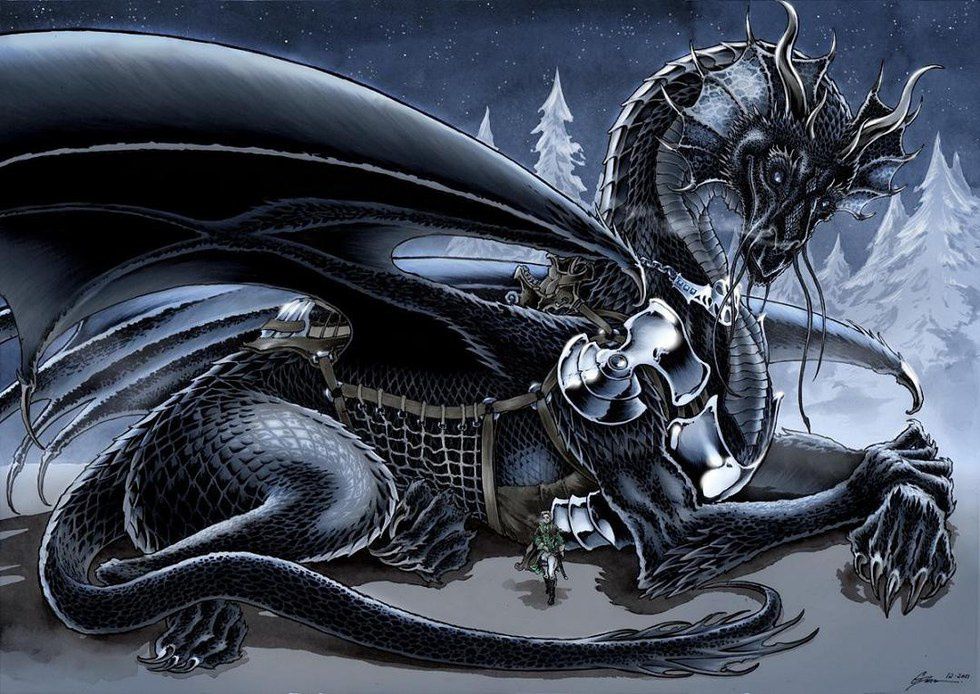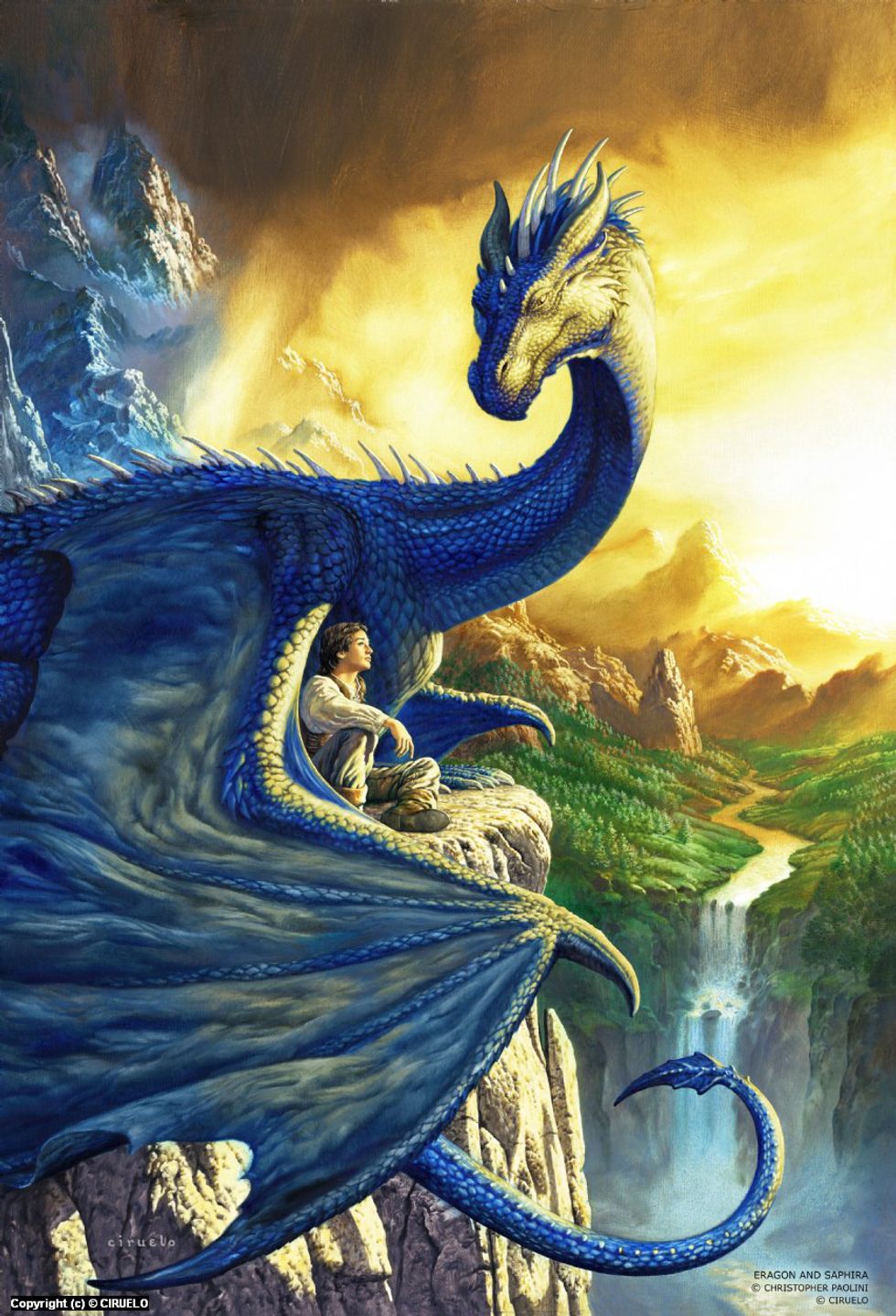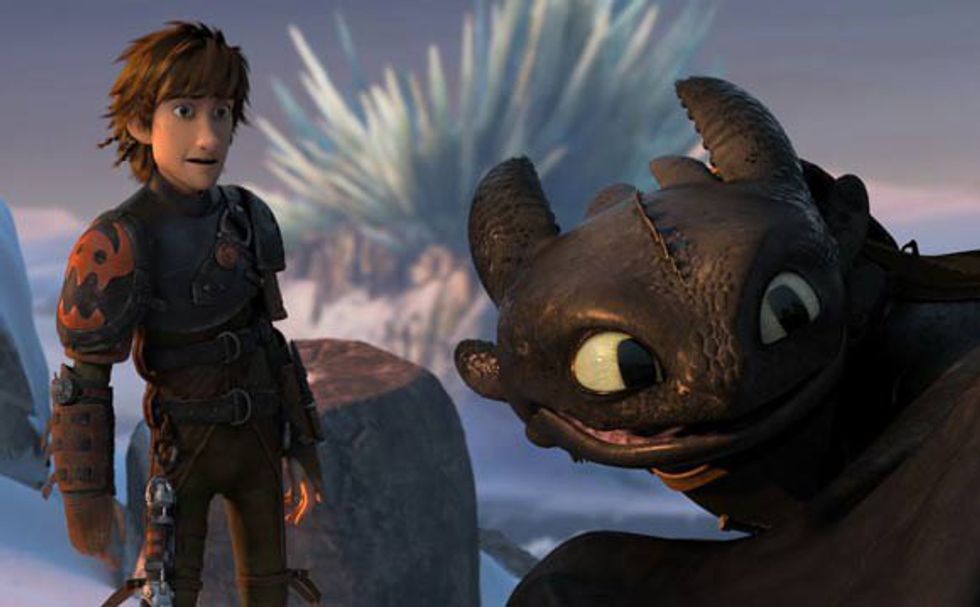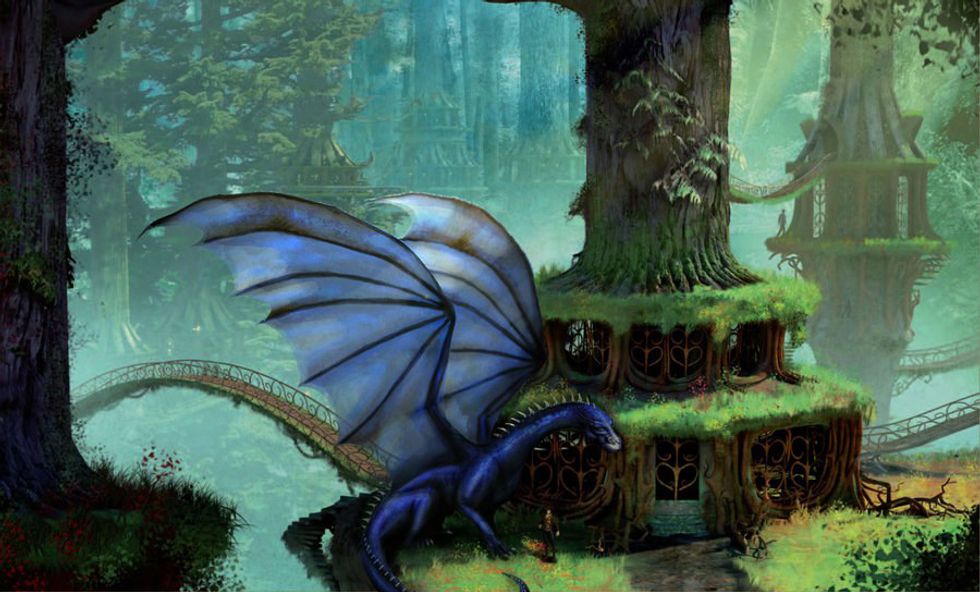First, the sound of thunder rumbles through the air. Deep, rhythmic booms shake your bones. Looking up, you watch, transfixed, as a black dragon with enormous horns lands on a stone turret not 20 feet away from you. He's stopped the headsman from dropping his ax on your neck, but he quickly turns to destroying the whole town. Thanks, dragon! Time to run for it. And not get eaten.
A lot of you will have recognized this scene as the opening gameplay in Elder Scrolls: Skyrim.
Alduin, aka the World-Eater as seen above, is the main antagonist throughout the game. The whole main plot and “dragon-born” idea spawns from the societal love of villainous dragons, along with Nordic influences. I can't complain too much about Skyrim's treatment of dragons because of Paarthurnax, the “good” dragon of Skyrim, who led a dragon rebellion (in an earlier era of Skyrim), and gave dimension to the dragons of Skyrim. What I'm getting to is basically my lifelong objection to how society chooses to view dragons more often than not: as the biggest, baddest burninators in existence, which can definitely be true, but usually only if you piss them off.
To me, dragons are bold, powerful, vain and fierce. They're some of the most intelligent and wittiest conversationalists you could ever hope to find. Dragons look out for themselves and those they care about. They're not just dangerous beasts with hides like jewels, with no thought for anything but what or who they might have a taste for. People don't see that dragons get lonely and jealous and lustful, just like the rest of us. Though, my argument could be perceived as biased, because I've loved dragons for as long as I can remember.
The recent addition of movies and book series that see dragons as more than vicious, magical guardians of the treasure trove has sewn wings to my heart. I relish the option to immerse myself in a world where dragons are not only plentiful, but integrated into society (if only as a military faction), and each dragon has a personality, quirks and their own thinking patterns and decision-making factors.
In the "Temeraire" series by Naomi Novik, you witness the bond between dragons and humans. You witness first hand as people begin to realize that dragons are more than mere beasts. They're partners, significant others to their captains/riders. What's more is the addition of abusive relationships between captain and dragon. Naomi Novik introduces dragons that have been matched with captains who abuse their power and are mean to their dragons. In contrast, the deeply loving and dedicated relationship between Temeraire and his captain Laurence shows not only the range of relationships that can be shared with such incredible creatures, but that both people and dragons have the capacity to be better than everyone expects of them. Novik also specifically uses Temeraire's unique and excessively curious personality in conjunction with the other dragons as voices who are just alien enough from the 1800s human society to judge it from the outside, often speaking with a more logical or modern perspective.
The series deals with the overarching theme of whether or not these sentient “animals” have rights in the eyes of the parliament, and through the main character's travels, we see how different parts of the world treat their dragons. Basically, if you love dragons and wish they were an integrated part of our world like I do, then you have to read this series. Plus, aerial battles with huge dragons loaded up with gun crews during the Napoleonic wars aren't anything to sneeze at.
My heart has and always will reside with "The Inheritance Cycle" by Christopher Paolini. This dragon series has been my favorite since I was nine years old, despite the Star Wars-loving, stolen-plot conspirators. The relationship between Eragon and Saphira isn't one of ownership, though that's how most of the humans and dwarves in Alagasia -- the world this series takes place in—see it. It's a partnership so deeply entrenched in their telepathic connection that it's hard not to get wrapped up in it. But the fear of these dragons is bred from ignorance. Most people are unaware that in most lore, dragons can talk! Or, at least, all the characters in these books seem pretty shocked whenever a dragon talks with its mind or mouth. One of my favorite things about dragons is the way that they will speak their minds and cut through the unreasonable standards of human society that people tend to just accept.
Saphira is wise and playful, cautious when she needs to be and yet the most magnificent creature to stalk the land in 100 years. There's magic imbued in everything a dragon does, without them even realizing. In the series, there's an interaction between Saphira and another dragon, one she finds after she already believes she's the only living member of her race (besides the poor broken-minded dragon that belongs to the evil king), and her enthusiasm gets the best of her. She blunders and makes mistakes because she's taken over by her emotions just like everyone else. The point I'm trying to make is that despite a dragon's majesty, mystery, and power, they can be just as flawed and relatable as human characters, so why wouldn't everyone love them?
"How To Train Your Dragon" is definitely my favorite animated movie because Hiccup, the main character, has a different idea about dragons, which is enforced when he finds a wounded one in the wild. But not just any wounded dragon -- the most rare and powerful breed of dragon, short of the one they come up with in the sequel, because sequels always have to be bigger and badder. (For the love of Hollywood...am I right?) The important takeaway here is the fact that Hiccup has no way to communicate with this “ferocious beast” that his society has conditioned him to hate. (Or tried to, at least.) With this specific dragon/rider relationship, we watch as an unbreakable bond is formed between these characters who are essentially committing treason. It's on that level, consorting with dragons. Hiccup studies Toothless, he learns about him, and in that discovery of knowledge, he sees what his entire society has missed about these dragons. With the death of his ignorance, he and Toothless change an entire society.
Dragons can't always be the villain. Ignorance is the only thing keeping them locked in that role, and it makes me happier than it probably should to see the side of dragons that I fell in love with shared with the rest of the world. I still long for the day I'll find a dragon egg, just like some fans long for the doctor to show up in his TARDIS, or for their letter from Hogwarts to arrive.


